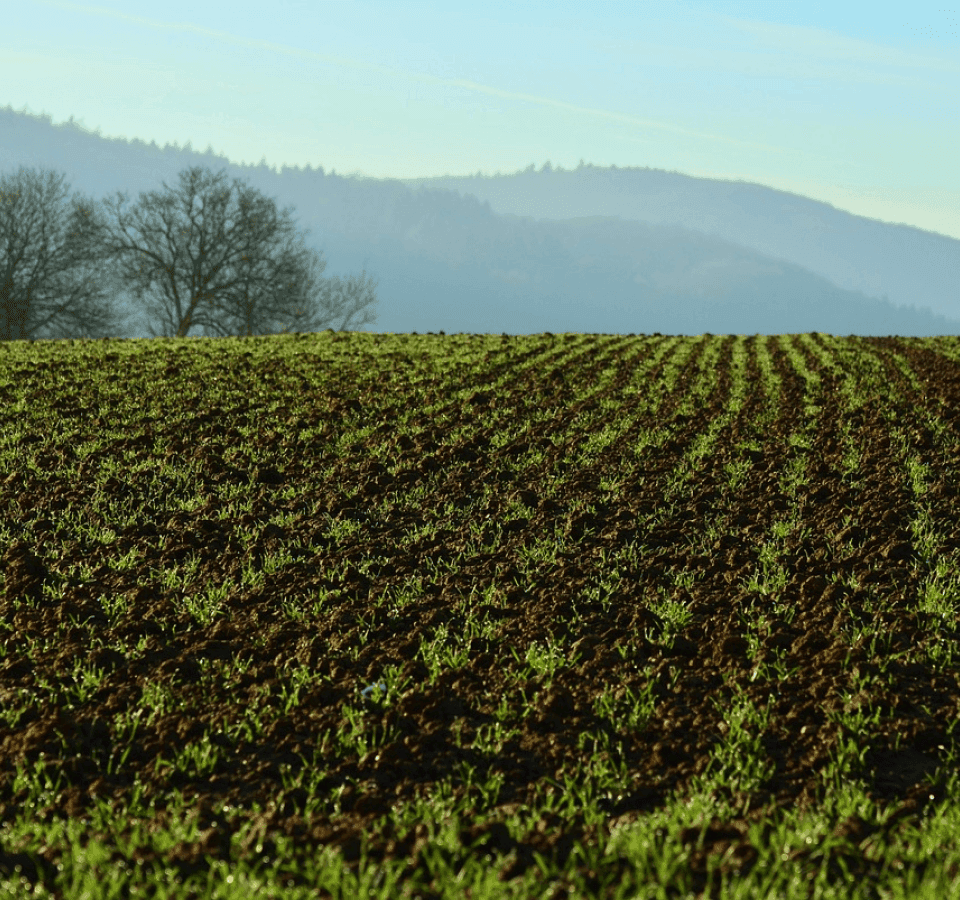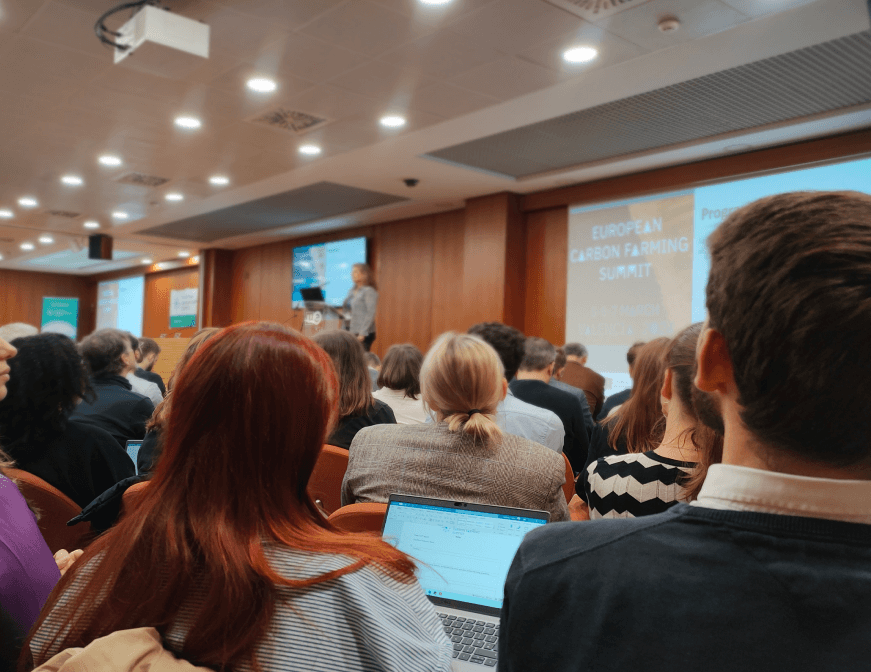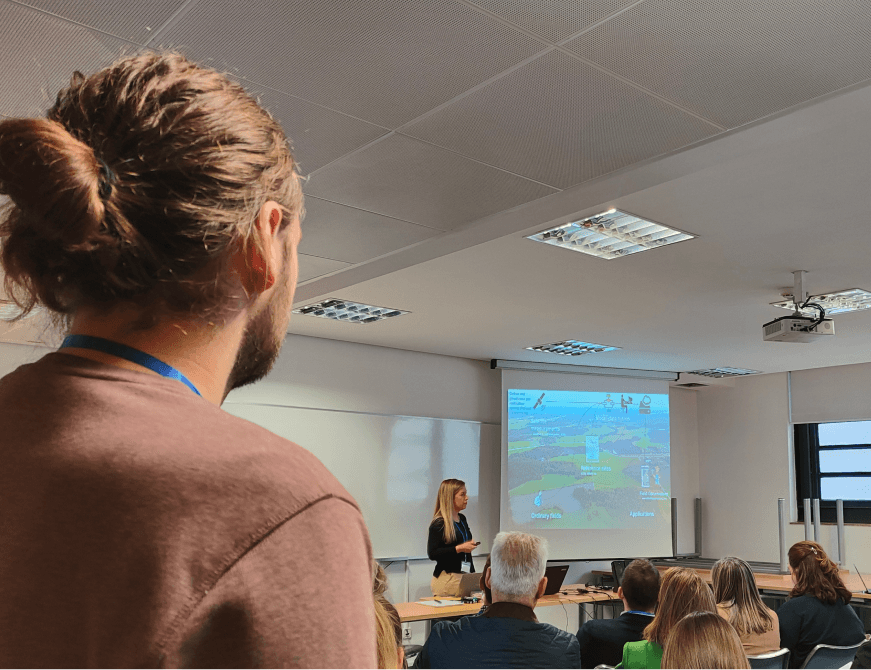Have your say on
how to enable
quick and
scalable carbon
removal in
agricultural soils.

Have your say on how to enable quick and scalable carbon removal in agricultural soils.
In order to tackle complex issues, it is good practice to split them into smaller challenges that we can feasibly address. This is why the Credible consortium proposes to shape carbon farming in the EU by taking concrete steps toward solving 11 specific limitations/challenges. We invite stakeholders to have their say on how to best do this. There are 3 ways of doing it:

Attend the EU Carbon Farming Summits
The summits are intended as a space for stakeholder to meet, share new technical advances, and discuss potential ways forward for removing barriers to the diffusion of carbon farming. The format of these events is similar to the notorious Conference Of Parties (COP), with, from one side, spaces to present knowledge/initiatives and, from the other, working sessions for the Focus Groups will be hosted to generate reports or recommendations. Go to the summit's web to know more about it.

Become an active member of a Focus Group
To become a member of a Focus Group means to commit to a multi actor process for identifying potential solutions. Details on how the conversations are coordinated can be found in this PDF document. Ideally Focus Group members should represent previous and current project/initiatives, with an extensive knowledge on the issue at stake. Select a specific Focus Group at the bottom of this page to better understand its goal and specific objectives.

Participate in the public consultations we host
Focus Groups are expected to generate periodic outputs in the form of opinions, recommendations or reports. A specific section in this website has been created to allow stakeholders to comment these outputs. The comments will be used to inspire follow-up rounds of conversations in the relevant Focus Group. Select the topic from the drop-down list to see whether a public consultation is currently open.
FG1.1: Which practices are relevant in the various EU pedo-climatic zones and land uses?
Description
There are many land uses and regions with different edaphic properties and climatic conditions. Determining the appropriate practices in each pedoclimatic zone and estimating carbon sequestration potential is a challenge. The scientific literature for some practices is often sparse, and field-level influences hinder the collection of robust evidence, especially for the estimated carbon sequestration potential, which contribute to exacerbate the debate around the potential impact of carbon farming. To solve the issue, it is therefore key to promote a wide scientific dialogue on the benefits of specific soil management systems. Existing and new data should be collected and compiled in support of these practices, with an eye on how to operationalise the knowledge for a faster practice implementation by land managers.
Ambition
The main objective of this group is to consolidate the knowledge and scientific evidence on the best management practices to capture and store carbon in (a variety of) soils, as well as to develop a framework to present this information. Such a framework is intended as a visually attractive factsheet, capable of capturing the scientific consensus and transmitting the impact and co-benefits of specific carbon farming practices. The expansion of this group into a large scientific network is intended to provide multi actors with the scientific support for promoting the practices of choice.
If you are interested in becoming a member of this focus group, please submit a request here:
SurveyFG1.2: How to measure the economic value of Soil Organic Matter in support of carbon farming?
Description
The tons of CO2 equivalents removed from the atmosphere and the revenues they could generate in carbon markets are often considered the only benefits of adopting carbon farming. However, for every ton of carbon sequestered in the soil there are almost 2 tons of soil organic matter (SOM) that are built-up, increasing soil fertility and hence supporting farm profitability. Agronomic benefits of SOM are rarely quantified in economic terms, and it is possible that farming solutions that are C-centred underestimate the financial payoff value of SOM increase. When calculated, SOM-co-benefits as estimated productivity improvement, nutrients replacement value, or reduced fuel consumption for soil tillage, the return of investment of carbon farming increases and becomes a top reason for participating in carbon programs.
Ambition
The objective of the group is to present a blueprint (aka a common accounting approach) with which practitioners and stakeholders can calculate the value of SOM co-benefits, including its value in terms of agronomic benefits as well as SOC sequestration value. The main agronomic benefits that are connected to higher amounts of SOM are: i) increased nutrient cycling measured as nutrients replacement value; ii) plant-available water-holding capacity measured as estimated productivity improvement, and; iii) improved aggregate stability measured as reduced fuel consumption for tillage. Ultimately, this FG will contribute to generate a common framework to price-tag some of the co-benefits of carbon farming, with the ambition to facilitate its diffusion among land managers.
If you are interested in becoming a member of this focus group, please submit a request here:
SurveyFG1.3: How to avoid threat to food production and biodiversity and support positive synergies?
Description
Enhancing soil organic carbon generally increases soil biodiversity but, when biomass is recycled to soil, this effect depends on the quality of the applied carbon inputs, with contrasting results. Moreover, there is also a lively debate about synergies/antagonisms between carbon farming and biodiversity protection, especially when certain plants are clearly superior at capturing carbon, which might lead to mono-cultural systems. On the other hand, a number of elements link carbon farming to food security. For example, practices that pursue increasing soil carbon (e.g. cover crops in orchards) are often accused of lowering crop production due to increasing competition for water and nutrients. Food security might also be affected by decreasing food production and/or increasing food prices following the setting aside of arable land for maximum soil carbon storage. Finally, the impact of “best carbon farming practices” on crop production and quality (thus on food security), is pedoclimatic-dependent, and the same practice can be positive or harmful depending on the farm. Shedding lights on these aspects is key.
Ambition
The objective of this Focus Group is to generate a comprehensive, evidence-based review of the effects of the most widespread carbon farming practices on soil biodiversity, crop production, and food quality and availability. Context-adapted guidelines for avoiding trade-offs and promoting positive synergies would be translated in recommendations for policy making.
If you are interested in becoming a member of this focus group, please submit a request here:
SurveyFG1.5: How to inspire and equip regional clusters for carbon farming scheme development?
Description
Sustainable carbon farming integrated in productive agriculture and forestry require regional and site-specific adaptation and supportive structures (incl. advisory and other services, monitoring, value chain development). For certified carbon removals, the QU.A.L.ITY criteria proposed by the Commission imply demands on the application, monitoring and safeguarding the practices and schemes, the full implications of which can only be understood through testing in regional pilots. Other ways of incentivizing carbon farming (like CAP support and value chain premia and insetting) have distinct emphasis and criteria which may allow better scalability across contexts. Furthermore, collaboration between the clusters can help uncover opportunities for scalable solutions in practices, policy, MRV and business models. Through engagement of key stakeholders, the regional clusters can develop into operational Carbon Farming Living Labs, supporting the Horizon Europe Soil Mission, applied research and European policy development.
Ambition
This Focus Group is set out to contribute to: i) accelerate the transfer from research to practice transfer; ii) reconcile between policy regulation and regional adaptation and development needs; iii) increase the economic incentive for carbon farming through innovative value chains and other market schemes, involving the food and fibre industry, finance and other services; iv) foster the creation of an economically viable models for Living Labs connected to carbon farming; v) developing regional AKIS and advancement of carbon farming in education, training and advisory structures.
If you are interested in becoming a member of this focus group, please submit a request here:
SurveyFG2.1: Minimum requirements to ensure carbon farming delivers sustainability benefits
Description
Carbon farming actions impact not just climate mitigation, but also numerous other societal objectives (e.g. biodiversity, water quality/quantity, soil health/quality). The proposed EU Carbon Removal Certification Framework (CRCF) establishes four QU.A.L.ITY criteria for certification, one of which is sustainability. However, it is not yet determined how this will be operationalised. If successful, it would ensure that carbon farming delivers multiple societal and environmental benefits, in addition to mitigation. This focus group will discuss how existing carbon farming standards and methods promote sustainability outcomes and identify best practices for how to operationalise the sustainability criteria within the CRCF (and beyond).
Ambition
The objective of this Focus Group is to bring together representatives of existing carbon farming standards, policy researchers, farmer representatives, and scientists with biodiversity and agricultural expertise, and to identify state-of-the-art, open issues and questions around the sustainability criteria within the QU.A.L.ITY framework. The desired output is a Report on options for standards to ensure environmental integrity and uptake, summarising best practices and making recommendations for how sustainability outcomes can be ensured when promoting carbon farming.
If you are interested in becoming a member of this focus group, please submit a request here:
SurveyFG2.2: What is the best scale for a carbon certification framework?
Description
This focus group is addressing the question of what is the best scale for a carbon certification framework or, to put it another way, what level of governance and centralization the future European framework should have to be robust, clear and effective, but also operational and attractive to farmers. A centralised framework can, for example, provide greater clarity for funders, reduce transaction costs and ensure the same level of requirements for everyone. Conversely, a decentralised framework can be better tailored to local circumstances and easier to use for local operators. Analysing feedback from stakeholders involved in international, national, and local certification frameworks will reveal the strengths and weaknesses of the different scales. The second question raised in this Group is, whatever the level of centralisation of the future European framework, how can we ensure that the scheme will be attractive to farmers and really help accelerate the deployment of low-carbon projects on the ground?
Ambition
The mission of this group is to generate a dialogue on the issue of scaling carbon schemes and the best level of governance for the future European framework, based on targeted interviews with key experts and representatives and discussions with the Focus Group experts. The objective is to create a report on the analysis of levers and barriers on how different types of funding can be directed towards result-based projects in a well coordinated and efficient way, and how to make the scheme as easy as possible for local operators to use in order to fully embrace the potential of carbon farming and upscale it.
If you are interested in becoming a member of this focus group, please submit a request here:
SurveyFG2.3: What combination of policy instruments to upscale carbon farming?
Description
The large-scale uptake of carbon farming in the EU will require significant changes in practices and investment by land managers, which must be supported by a conducive policy environment and economic signals. So far, most attention within EU policy circles has focused on how the EU’s forthcoming Carbon Removals Certification Framework, and to a lesser extent the Common Agricultural Policy, will promote carbon farming. However, other EU Policies have the potential to play an important role too, and the interaction between different policies is also of huge importance. The Focus Group will bring together key policy stakeholders, including farming organisations, scientific institutions, environmental civil society organisations, policy makers, and other agriculture and food sector representatives. It will provide increased knowledge about best governance practices through capacity building and facilitated discussions, identifying synergies between various policies in terms of their potential to upscale carbon farming through agroecological practices (such as the LULUCF Regulation, the Nature Restoration Law, the Soil Health Law, and others). It will also analyse how the Carbon Removal Certification Mechanism will interact with other policy priorities and instruments within the EU, such as mandatory requirements, financial incentives for carbon farming, and climate targets.
Ambition
This focus group will aim to produce reflections and recommendations for how the EU can develop a holistic policy and rewarding approach to upscale carbon farming.
If you are interested in becoming a member of this focus group, please submit a request here:
SurveyFG3.1: How to harmonise public and private datasets for mapping and monitoring soil carbon dynamics?
Description
A barrier in the diffusion of carbon farming is the put in place of a robust system for carbon farming certification, with a public system to certify the private companies which produce and sell the carbon credits certificates. Both by the side of farmers and by the side of the companies, willing to buy those certificates, there is the need to have a publicly regulated certification system. Different systems are currently used for Monitoring Reporting and Verification (MRV), based on differentiated approaches in terms of modelling, analytical/estimation methods, and sampling protocols applied. Every MRV system implies a different level of uncertainty, which is rarely explicitly declared. Furthermore, the data produced by the private sector is usually not accounted for in the national reporting, due to the lack of a system for data quality & standardisation, data harmonisation and data sharing. A EU-wide harmonisation is needed towards a EU-wide system of harmonised national reporting. The objective of the focus group will be to coordinate among different initiatives ongoing on the topic (e.g. EJPSOIL, MARVIC, MRV4SOC, ICOS, eLTER, EUROSOLAN, SOILWISE, BONARES, among others), and with JRC-EUSO, in order to align with the European Commission objectives.
Ambition
A roadmap for harmonisation and improvements of mapping and monitoring soil carbon dynamics (stocks and fluxes), supporting the EUSO in the construction of an EU-harmonised soil monitoring system, will be delivered at the end of 3 discussion cycles (D3.1 - March 2026). To reach this long term outcomes, the focus group will contribute to: 1) Linking existing monitoring systems and data manager into a network for discussion strength and weaknesses of soil carbon monitoring approaches (Mar 2024); 2) Identify operational options for a EU-level harmonised monitoring system (Mar 2025); 3) Propose concrete plans to implement the system (Mar 2026).
If you are interested in becoming a member of this focus group, please submit a request here:
SurveyFG3.2: How to best exploit innovations in proximal sensing and digitalization for carbon farming?
Description
The rapid and continual development of digital technologies presents opportunities and challenges for carbon farming (CF). Probably the greatest challenge is incorporating and connecting diverse technologies into cohesive monitoring, reporting and verification (MRV) systems. This Focus Group works towards this goal by characterising the current extent, interconnectedness and possible future roles of digital technologies in CF. It pays particular attention to proximal sensing and related digital monitoring techniques where near surface or contact sensors are used to capture soil properties. The group also probes the wider ecosystem of digital technologies that encompass CF MRV systems including digital farmbooks, IoT, drones, digital soil mapping, artificial intelligence and FAIR principles. Finally, it looks beyond technical issues to uncover the challenges and barriers to the adoption of digital methods, i.e. technological resistance, by the end users.
Ambition
This focus group is set out to achieve the following objectives: i) survey the digital technology CF landscape with particular attention paid to proximal sensing; ii) crystalize the current and future role of digital technologies in MRV systems; iii) uncover the barriers to adoption, termed technological resistance, and suggest a path forward.
If you are interested in becoming a member of this focus group, please submit a request here:
SurveyFG3.3: How Earth Observation is supporting the Measurement, Reporting and Verification (MRV) methods on Carbon removals?
Description
Satellite-derived data plays an important role in supporting carbon removal certification methodologies by providing valuable information that helps to accurately assess and monitor the amount of carbon that is being stored in various ecosystems. This information is critical in determining the effectiveness of carbon removal efforts and can help guide future strategies to improve their efficiency. New capabilities in terms of the spatial, temporal and spectral resolution of the data have enabled more efficient and reliable monitoring of the environment over time at global, regional and local scales. The Focus Group will contribute to strengthening and informing the technical evidence base to guide the implementation of the new carbon removals policy approach and portfolio development. Its advice will help the EC expert Group on Carbon removal to develop a more integrated and strategic monitoring process.
Ambition
The key outcome of this focus group is to assist the European Commission in better understanding the benefits of satellite information systems for monitoring soil carbon stocks in the EU. This will be achieved through a collaborative consultation and an ongoing dialogue with different stakeholders in the target sectors.
If you are interested in becoming a member of this focus group, please submit a request here:
SurveyFG3.4: How to use data from long-term monitoring sites in the context of carbon farming?
Description
Robust MRV is essential to ensure that carbon removals have environmental integrity and are real, additional, measurable, permanent, and avoid carbon leakage and double counting. While robust MRV is essential, it also poses a major challenge as it can be expensive to accurately measure and validate the GHG impact of carbon farming, resulting in a trade-off between MRV accuracy and cost. High MRV costs (financial or time) can act as a significant barrier to farmers voluntarily implementing carbon farming actions or to administrators establishing policies. Monitoring can be achieved by direct measurement, modelling, or a combined approach. In order for carbon farming to achieve its goal, measurements and models that are being used in the MRV network must be sufficiently reliable. Therefore, the MRV network should be able to make use of, among others, controlled field experiments on research stations and pilot farms to understand the impact of carbon farming practices on soil carbon and the necessary experimental data and metadata to calibrate and validate carbon models. Several initiatives have already been launched to group existing long-term monitoring sites and to compile all available data. However, up till now, information remains scattered or is incomplete to be of use for the calibration/validation of carbon models. Within this Focus Group we will gather the experiences of coordinators of different networks/communities in order to come up with a set of guidelines and considerations on the set-up and management of a network of long-term monitoring sites that are able to support regional carbon schemes.
Ambition
Building upon the input of the network coordinators, a set of guidelines and considerations on the set-up and management of a network of long-term monitoring sites (LTMs) will be published that are able to support regional carbon schemes. The guidelines will include information on necessary criteria for LTMs to be integrated into the network, (meta)data-availability, data harmonisation needs, exchange and management, communication, involvement of actor groups (e.g. LTM-owners), funding, etc. that all are vital to validate/calibrate predictive models that are included in MRV systems.